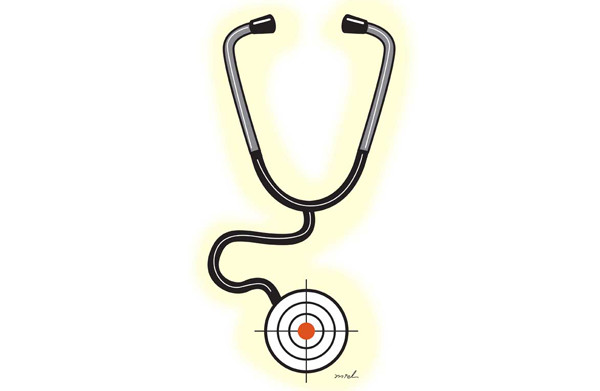Beating cancer without chemotherapy

A patient with malignant lymphoma always makes me sit up.
One reason is that I have a special interest in this subject.
The more important reason is that a patient with this disease has a good chance of responding well to treatment, as well as a high chance of full recovery.
LUMP WAS RED AND RAW
Earlier this month, I saw Mei, who is in her mid-20s.
She had been having a painful swelling on the right side of the neck for six months.
In Indonesia, she saw several doctors and was prescribed antibiotics without much success.
She tried herbal medicines as well as home remedies that included rubbing ginger over the swelling.
Instead of getting better, the lump grew larger and the skin over it became inflamed, painful, red and raw.
At that stage, it looked very much like an abscess and she came to Singapore to seek help.
When she came to see me for a second opinion, my initial impression was that this was cancer, and likely malignant lymphoma because the swelling was actually a matted mass of enlarged lymph nodes on the right side of the neck, with several smaller but enlarged lymph nodes on the other side of the neck.
A core biopsy was carried out and the diagnosis of malignant lymphoma was confirmed.
Chemotherapy was administered.
Within a week of treatment, even before her hair started falling out, the mass had shrunk and she was feeling normal again.
With the continuation of chemotherapy, Mei is likely to do well. Studies suggest that she would have at least an 80 per cent chance of a cure.
WHEN CHEMOTHERAPY FAILS
Most patients who are diagnosed with lymphoma are likely to have a favourable outcome.
Unfortunately, there are some who do not.
Whenever a lymphoma patient fails to respond to treatment or if the disease recurs, we struggle with second-line or third-line chemotherapy programmes and often need to consider high-dose chemotherapy with stem-cell and bone-marrow transplant.
Madam Lai, 43, from Malaysia, was one such patient.
She had stage 4 low-grade lymphoma and had cancer cells in the bone marrow in July 2013.
She underwent six cycles of chemotherapy and went into remission.
Eight months after the completion of chemotherapy, we spotted some new enlarged lymph nodes in her neck.
By October last year, the lymph nodes had increased in size and a repeat biopsy confirmed that the lymphoma had transformed from low-grade (meaning slow-growing) to high-grade.
She was started on a standard chemotherapy programme for high-grade lymphoma.
After two cycles of treatment, a follow-up positron emission tomography-computed tomography (PET-CT) scan showed that there was a slight but unremarkable improvement.
By and large, we expect to see major and dramatic responses whenever we treat lymphoma patients with chemotherapy.
Anything less is a harbinger of bad news.
The standard approach is to deploy a more aggressive chemotherapy programme, keeping in view the possibility of a stem-cell transplant.
After consulting a couple of my colleagues, I decided to treat her with a new targeted agent called ibrutinib.
There have been several medical reports describing the effectiveness of this drug.
Unlike most chemotherapy methods, ibrutinib comes in the form of a tablet and is taken orally.
After 28 days (which is one cycle) of taking the medicine, all her enlarged lymph nodes were gone.
A PET-CT scan done after three cycles of medication confirmed that Madam Lai was again in remission. With maintenance treatment, the chances of controlling the disease is high.
RISE OF PRECISION MEDICINE
While there continues to be a role for chemotherapy for the majority of cancer patients, there is a growing arsenal of targeted agents which can be deployed for selected individuals with certain types of cancer.
Targeted agents have already been proven to be useful in treating lung cancer, colorectal cancer, breast cancer and many others.
They are likely to have less side effects, higher efficacy and more sustained responses.
As many of these new agents are taken orally, I believe that the day will come when treating cancer will be like treating hypertension or diabetes - all the patient needs to do is pop a pill a day.
The era of precision medicine for cancer patients is coming.

This article was first published on June 25, 2015.
Get a copy of Mind Your Body, The Straits Times or go to straitstimes.com for more stories.